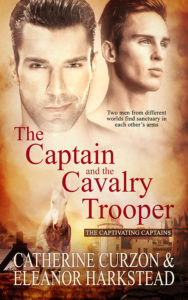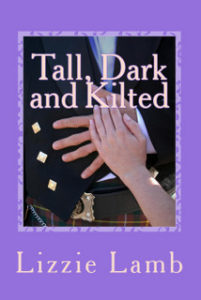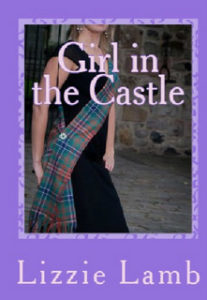Eleanor Harkstead's Blog, page 17
March 17, 2018
C F White reviews The Captain and the Cavalry Trooper
“If you’re a fan of historical romance, soldiers in uniform, beautiful English prose, then I highly recommend this book.”
A gorgeous Goodreads review of The Captain and the Cavalry Trooper by author C F White – many thanks!

Review of The Captain and the Cavalry Trooper
“If you’re a fan of historical romance, soldiers in uniform, beautiful English prose, then I highly recommend this book.”
A gorgeous Goodreads review of The Captain and the Cavalry Trooper by author C F White – many thanks!

March 3, 2018
Guest blog: Why I write Scottish-themed romance
Braw! I’m very glad to be welcoming Lizzie Lamb to my blog today. I’m a fan of her novels set in Scotland, and I hope you will be too!
Thank you for having me on your blog, Eleanor, I hope your followers will enjoy reading my about the reasons why I write Scottish-themed contemporary romance.

My interest in kilted heroes began as a child, reared (courtesy of Saturday morning cinema) on the exploits of Highlanders in such movies as Rob Roy, Bonnie Prince Charlie, The Ghost Goes West and, sob, Greyfriar’s Bobby. After the movie (or fil-um, as we pronounced it) we’d re-enact Rob Roy’s leap and subsequent escape through the waterfall, or the scene from Kidnapped, where Davie Balfour is almost murdered by his evil uncle. Our dogs were dragooned into being “Bobby”, loyally guarding his master’s grave in Greyfriar’s kirkyard, Edinburgh. And I longed to be Flora Macdonald, helping Bonnie Prince Charlie escape over the sea to Skye and away from the Redcoats.
Tales of brave Covenanters and Jacobites stayed with me as I grew older and read Scottish-themed novels . . . The Jacobite Trilogy by D.K. Broster (falling in love with Ewen Cameron), The Lymond Chronicles (who could resist Francis Crawford?) More recently, the Outlander Series by Diana Gabaldon featuring uber-hero Jamie Fraser has fired my imagination, For me, he is the ultimate kilted hero and has it in spades – looks, sense of honour, loyalty, is sex-on- legs and can speak Gaelic. I’ll even admit to subscribing to Amazon Prime so I could watch the TV Series:
Outlander.

Readers, I have discovered, are drawn to the mystical, dreamy highlands of Scotland as the backdrop to contemporary romance. As I writer, born and bred in Scotland, I heartily agree with that sentiment. Tall, Dark and Kilted features a sexy laird Ruairi (Roo-ary) Urquhart who has to fight to safeguard his land and inheritance. In Scotch on the Rocks, kilt-wearing American, Brodie arrives on Eilean na Sgairbh on the back of a storm wind and turns my heroine’s life upside
down.

In my latest novel Girl in the Castle, the heroine – a disgraced academic – hides away in a castle in the highlands while she sorts out her life. There’s a phantom piper, a lost Jacobite treasure and a love affair to keep readers interested.
Romance readers simply love a novel which features a man in a kilt. The element of ‘costume’ (ie the kilt), especially in a contemporary setting, removes the hero and the reader from the everyday and transports them into the realm of fantasy and romance. And, in the case of a kilted hero, there is also the tease of whether he’s followed tradition and gone ‘commando’, or not! My novels seem to hold a particular resonance for ex-pat Scots in USA, Australia, New Zealand and
Canada and sell well in those countries. As a Scot, I try to write with complete authenticity about Scotland – the land and its people.

The kilted hero in my novels is, generally, aristocratic – a laird, at the very least. And, while he does not have to work to earn his daily crust, he carries the weight of his inheritance and the welfare of his tenants and family on his shoulders. He often has emotional scars which only the heroine can heal. My novels have a happy ending and readers can close the book with a satisfied sigh knowing that all the obstacles which have prevented the hero and heroine from leading a happy life, have been resolved.

I love travelling round Scotland and have completed Coast 500 and as I travel I pick up ideas for future novels. As for the Gaelic, I have Gaelic-speaking friends on Islay and South Uist who help me. In case you’re wondering what my favourite Gaelic phrase is, here you go: ‘Is tu an solas na mo bheatha. You are the light of my life.’ Or, in the slightly more prosaic lingua franca of the Central Belt: ‘I wisnae pushed, I didnae shove, I just met you and fell in love.’
 Lairg, West Highlands
Lairg, West HighlandsSo, dear and gentle readers, I hope you have enjoyed learning a little about what drives me to write Scottish-themed romances. You can learn more about them, and me, on my website and via my other links. Do get in touch as I love hearing from my readers.
See Lizzie Lamb’s books at Amazon, sign up to her newsletter, visit her website, check out her titles on Goodreads, and find out what she’s up to on Twitter.
Girl in the Castle
Her academic career in tatters, Dr Henriette Bruar needs somewhere to lay low, plan her comeback and restore her tarnished reputation. Fate takes her to a remote Scottish castle to auction the contents of an ancient library to pay the laird’s mounting debts. The family are in deep mourning over a tragedy which happened years before, resulting in a toxic relationship between the laird and his son, Keir MacKenzie. Cue a phantom piper, a lost Jacobite treasure, and a cast of characters who – with Henri’s help, encourage the MacKenzies to confront the past and move on. However – will the Girl in the Castle be able to return to university once her task is completed, and leave gorgeous, sexy Keir MacKenzie behind?
February 19, 2018
The Captain and the Cavalry Trooper: an excerpt

Pre-order The Captain and the Cavalry Troper from 20 February 2018.
Northern France, 1917
The wagon carrying Jack Woodvine bumped and jerked along the poplar-lined lanes, a fine spray of mud rising up each time the huge wooden wheels splashed through a puddle.
He had given up checking the time and, even though the journey was far from comfortable, tried to doze as he passed along under the iron-gray sky. A chateau, they’d said. Different from the barracks he’d been in when he was first deployed. Doubtless it would be a dismal old fortress, but was it silly of him to hope for bright pennants fluttering from a turret?
Finally, the wagon drew up at a gatehouse of pale stone. As Jack climbed out, dragging his kitbag behind him, sunlight nudged back the clouds and turned the gray slate of the roofs to blue.
“You the new groom?” A soldier appeared from the gatehouse. His cap was so low over his eyes that Jack couldn’t make out his expression.
“Yes—Trooper Woodvine. Jack Woodvine.” He took a letter from his pocket and held it out to the man. “I’ve been transferred from another battalion. This is the Chateau de Desgravier?”
“Yes, Trooper! Turn left at the bottom of the drive for the stables. Quick march!”
The last thing Jack wanted to do was march, quickly or otherwise, but he shouldered his kitbag, jammed his cap onto his head and marched down the tree-lined avenue.
It was thickly leaved, but through the branches he could see the white stone of the chateau ahead. He rounded a bend in the driveway and he saw it—Chateau de Desgravier.
An enormous tower rose up in front of him, its roof reaching into a delicate point. Jack sighed, the spots of mud on his face cracking as he smiled. It might not have had pennants floating from it, but it was exactly like something from a fairytale. Beside the tower were the stone and brick and filigreed windows of what looked to Jack like a palace. Who would ever think that the front was only a few miles to the east?
Quick march!
Jack continued on his way, turning to his left just as he’d been ordered. The path here bore evidence of horses—straw, manure, the marks of horseshoes. Ahead, an archway, figures at work. A lad of Jack’s age maneuvering a wheelbarrow, another leading a horse out to the paddock.
This wouldn’t be so bad. It seemed to be a peaceful place, and easy work for a lad like Jack. He raised his hand and grinned at the grooms as he headed under the archway and into the vast stable yard.
Then he heard singing. In French.
Jack dropped his kitbag and looked round. The voice was that of a man, yet heightened slightly, giving it a teasing, effeminate edge, and Jack couldn’t help but follow it like a sailor lured by a siren, pulled along the row of open stables toward that lilting chanson. Inside those stables young men labored and sweated, brooms swept and spades shoveled, yet one of the boxes at the far corner of the yard seemed to have been transformed into an impromptu theater.
Jack hardly dared glance through that open door, yet he couldn’t help himself, blinking at the hazy darkness of the interior where half a dozen grooms lounged in the straw, watching the chanteur in rapt silence.
Right in front of Jack, his back to the door, was the figure of a young man, clad in jodhpurs, polished riding boots and nothing else. No, that wasn’t quite true, because he was wearing something, the sort of something Jack didn’t really see much of in Shropshire. It was some sort of silken scarf, a shawl, perhaps, that was looped around his neck twice, the wide, dazzling red fabric decorated with intricate yellow flowers. They were bright against the pale skin of his naked back, as bright as the tip of the cigarette that glowed in the end of a long ebony cigarette holder that the singer held in his elegant right hand. He gestured with it like a painter with his brush, making intricate movements with his wrist as he sang, his voice a low purr, then a high, tuneful trill, then a comically deep bass that drew laughter from his audience.
He moved with the confidence of a dancer, hips swinging seductively, head cocked to one side, free hand resting on his narrow hip and here, in this strange fairytale place, he was bewitching.
The singer executed a near-perfect pirouette yet quite suddenly, when he was facing Jack, stopped. He put the cigarette holder to his pink lips, drew in a long, deep breath and blew out a smoke ring, his full lips forming a perfect O.
“Well, now.” He sucked in his pale cheeks and asked, “Who on earth have we here?”
Jack blinked as the smoke ring drifted into his face.
“Tr-trooper Woodvine, reporting for Captain Thorne. I’ve been transferred—I’m his new groom. I don’t suppose—”
The words dried in Jack’s throat. As enthralling as this otherworldly figure was, with his slim face and high cheekbones, there was an unsettling glint of mockery in his narrow blue eyes.
“Sorry.” Jack took a half-step backward. “I interrupted your song. I should…”
The singer moved a little, just enough that he could dart his head forward on its slender neck and draw his nose from Jack’s shoulder to his ear, breathing deeply all the way. They didn’t touch but the invasion, the authority, was clear. However lowly their station, Jack had wandered innocently into someone else’s domain.
When the young man’s nose reached Jack’s ear he threw his head back and let out a loud sigh through his parted lips, arms extended to either side. Then he finally spoke again, declaring to the heavens, “I smell new blood!”
Behind him, his small audience tittered nervously and his head dropped once more, those glittering blue eyes focused on Jack.
“Trooper Charles, sir!” He executed a courtly bow, the hand that held the cigarette twirling elaborately. “But you’re so darling and green that you may address me as Queenie. Aren’t you the lucky one?”
Jack reached for the doorframe to casually prop himself against it and essay the appearance of calm. Queenie?
“You may call me Jack.”
He extended his free hand to shake. A handshake showed the mettle of a man, his father was always telling him so. A good, firm hand at the market and a fellow would never have his prices beaten down.
Queenie’s narrow gaze slid down Jack like a snake and settled on his hand. He didn’t take it, didn’t move at all for a few seconds as the silence between them grew thicker. Then, in one quick movement, he placed his cigarette holder between Jack’s fingers and said, “Have a treat on me. Welcome to Cinderella’s doss house!”
Jack brought it hesitantly to his lips, smiling gamely at the grooms who made up Queenie’s audience. He pouted his lips against the carved ebony and inhaled.
The cough was so violent that Jack nearly dropped the holder, but an instinct in him born of a lifetime on a farm of tinder-dry hay meant he clamped it between his fingers. As he heaved for breath, he stamped on the nearby straw, suffocating any sparks that might have fallen.
The other grooms laughed and Queenie’s head tipped back to emit a bray of hilarity as a strong hand walloped Jack’s back.
A friendly Cockney burr chirruped, “Cough up, chicken—there’s a good lad!”
“We have a new little chicky in our nest,” Queenie told his audience, turning to address them. “I want you all to make him terribly welcome, or he might burn down our stables and then where would your Queenie sing?”
The stocky lad who had rescued Jack from his coughing fit was a head shorter than him. He pulled a face that could have been a smile or a sneer and took the cigarette holder from his fingers. He passed it to Queenie, all the while fixing his stare on the new arrival.
“Trooper Cole. Wilfred, that’s me. You’re Captain Thorne’s new boy, aren’t you?”
He laughed, then turned his head to spit on the floor, pulling a skinny roll-up from behind his ear.
“I’m Jack Woodvine. I mean…Trooper Woodvine.”
“I s’pose me and Queenie better take you to your quarters?”
“That would— But…oughtn’t I to introduce myself to Captain Thorne?”
“I’d say that’s a bit difficult, seeing as he’s not here at the moment.” Wilfred picked up Jack’s kitbag as easily as if it were spun from a feather. “Come on, soldier. Your palace awaits!”
“Captain T is an angel.” Queenie draped one arm sinuously around Jack’s shoulders and walked him back across the stable yard, his naked torso pressed to Jack’s rough tunic. “You’re going to have a bloody easy war, he’s soft as my mother’s newborn kitten.”
He glanced back at Wilfred and asked, “Wouldn’t you say so, Wilf?”
“Not half!” Wilfred laughed, striking a match to light his cigarette. “You couldn’t find a nicer bloke in the entire regiment.”
Jack grinned as they headed up the creaking wooden stairs above the stables. New quarters and new friends, and he wouldn’t have to rough it in a tent. Maybe there’d even be warm water for a bath.
“Well, that’s good to know. The officers were a bit…brusque at my last place.”
“Brusque?” Wilfred raised an amused eyebrow. “That’s a fancy word for a groom!”
“Ignore our lovely Wilf. Strong as an ox, bright as a coal shed.” At the top of the stairs Queenie turned to address Wilfred and Jack, his pale hand resting on the crooked handrail. “Thorny is adorable, not brusque at all. Welcome to our little slice of heaven!”
With that he lifted the latch and threw the door open, directing Jack to enter with another low bow.
Is Captain Thorne as thorny as his name suggests, or is really as soft as a kitten? Find out in The Captain and the Cavalry Trooper.
February 15, 2018
The chorister and the Scout leader
 Empty choir stalls in the redundant church of St Lawrence, Evesham.
Empty choir stalls in the redundant church of St Lawrence, Evesham.After my talk at Evesham Library on Friday, as part of Evesham Festival of Words, I went for a walk around the town. I’d never visited Evesham before, and I became rather fond of its Georgian frontages along the main road. I took a side street and found myself surrounded by timber-framed buildings. By accident, I ended up walking through a Norman gatehouse and out into a space that contained not one but two very old churches, very close together.
I have never in all my days seen two churches standing that closely together before. Apparently, no one knows why St Lawrence’s and All Saints were built there, about fifty feet apart. All Saints still functions as a parish church, but St Lawrence’s is redundant, cared for by the Churches Preservation Trust.
I happily wandered round both churches, and in All Saints, I saw the plaques which are in every church around the country – to the locals who died in war. One of them records the death of a man in the First World War who had once been a chorister in the church, and another brass plaque commemorates a man who had been a Scout leader before being sent off to war.
The reminders of what these men had contributed to their home town before life changed for them forever are in some ways what humanises them and reminds us of what was lost. Not just names, but people who had been part of a community and whose early deaths left a space behind them.
In The Captain and the Cavalry Trooper, Jack becomes friends with Bryn Pritchard, who before he joined the army, was a choir master in his local chapel. It was only after I’d given Bryn his backstory that I realised I was drawing on some of my own family’s history. My great-grandad was a choir master at his local Methodist church (he was very proud to have staged Handel’s Messiah), and his son – my grandad – had been a lay preacher on the Methodist circuit before the Second World War broke out. I was looking through some papers and photographs not long ago and found the circuit list for 1939. My grandad had put asterisks by his name, and a line through them one by one as he marked the services off.
But before the end of 1939, the lines stop. And this would have been when my grandad went voluntarily into the army – no more preaching for him on the Methodist circuit. At least, not until 1946 once he came safely home.
In the universe that The Captain and the Cavalry Trooper inhabits, there was a chapel missing its choir master. And in the real world, in Evesham, there was a space in the choir stalls.
February 11, 2018
Romantic Novelists’ Association guest blog

In case you missed it, back in January I wrote a guest blog for the Romantic Novelists’ Association, The Gay Romance Market: A Woman’s Perspective. And it includes a Q&A at the end with Catherine and me.
February 6, 2018
Captivating Captains and a cavalry trooper
I have news!
The Captain and the Cavalry Trooper, a novel co-written by Catherine Curzon and me, will be published by Pride on 3rd April 2018. We’re both really excited about the novel and can’t wait for you to meet Captain Thorne and Trooper Woodvine. You’ll be able to pre-order it from 20th February.

And that’s not the only piece of news – The Captain and the Cavalry Trooper is the first novel of our Captivating Captains series for Pride. We have lots of lovely captains, both contemporary and historical, who are waiting for you in a very neat, orderly queue where they are quite possibly polishing their buttons and admiring themselves in their shiny boots, or looking disheveled and lovely.
The Captain and the Cavalry Trooper
As the Great War tears Europe apart, two men from different worlds find sanctuary in each other’s arms.
Captain Robert Thorne is the fiercest officer in the regiment. Awaiting the command to go to the front, he has no time for simpering, comely lads. That’s until one summer day in 1917 when his dark, flashing eye falls upon the newest recruit at Chateau de Desgravier, a fresh-faced farmer’s boy with little experience of life and a wealth of poetry in his heart.
Trooper Jack Woodvine has a way with strong, difficult stallions, and whispers them to his gentle will. Yet even he has never tamed a creature like Captain Thorne.
With the shadow of the Great War and the scheming of enemies closer to home threatening their fleeting chance at happiness, can the Captain and the Cavalry Trooper make it home safely? More importantly, will they see peacetime together?
The Captivating Captains
Throughout the ages, the image of the stern, unyielding captain, resplendent in his immaculate uniform, has been a staple of fiction. He instills loyalty, devotion and sometimes fear in the hearts of his men, and they’ll follow him anywhere.
It’s time to meet a new generation of captains, who still make their men tremble, but for very different reasons. From the oh-so-proper ballrooms of the Regency to the hellish trenches of World War One, the flashing cutlasses of the Golden Age of pirates to the chilly bunkers of the Cold War, these captains will have you hungry to join their ranks.
January 13, 2018
Anyone for cricket?
Something rather exciting happened the other day, but I’m not saying anything yet – you’ll have to wait!
As I am unable to resist a teaser, though, here’s my dad’s battered old cricket bat.
January 9, 2018
An Actor’s Guide to Romance: an excerpt
Every hero needs his villain. The thorn in his side, the shadow on his sun, the fly on his teacake. Holmes had his Moriarty, Superman had Lex Luther, ET had the lack of intergalactic telephone lines and Thomas Fox had Adam Fisher. From that long-ago audition at drama school when each had chosen a monologue that had stopped the panel in its tracks to the first of innumerable shared curtain calls when a new Jeeves met his Wooster, he was always there, always up for the same roles, his name on the same lists that were proposed for your consideration, matching every single achievement until, still chasing one another’s shadow more than two decades after that very first meeting at RADA, together they had waited for Godot. They were like a mirror image, two careers on parallel lines, from youthful love interest to middle-aged gravitas, each as decorated, as popular, as perfect as the other.
Maybe they always would be until one died or they killed each other.
Who knows?
In any titanic struggle, the parties must know their places and right now, theirs was a dingy basement off Covent Garden, where Thomas and Adam were embracing.
“Thank god we found each other. What would I do without you, darling?”
Adam rolled his eyes. Not enough for it to be noticeable from the front row, but Thomas noticed, because he intended Thomas to notice. Because that was the sort of thing that Adam did, the sort of thing he had always done. He rolled his eyes, gave a little sigh and finally whispered, “Did you have onions at lunch?”
Then he raised his voice to an audible volume and replied, “I feel as though I’ve been searching all my life for something, and I didn’t realize until we found each other.”
Thomas gazed down at Adam’s full lips and, despite sudden stiffness in his neck, began to lower his face to kiss him. Adam blinked, his blue eyes shining when they met Thomas’ gaze, his embrace around Thomas’ waist tightening. He pursed his lips, blinked again and declared, “God, that is oniony!”
Thomas flung up his hands and backed out of their embrace. “I can’t bloody do this, Adam, if you keep titting about!”
From the side of the room there came a flurry of movement as their solo audience threw up her hands, dashing script pages across the floor. Gill Henley rose from her seat in a whirlwind of scarves and floral print and exclaimed, “For Christ’s sake, gents, this scene again! Can you not just plough through and pretend you might actually be in love? You’re supposed to be actors, so act!”
“It was a joke, darling!” Adam was all innocence now, of course, because he would be, wouldn’t he? He put his hands on his hips and addressed Thomas. “You dragged me out of character, Tom Fox. It’s a cheap way to steal a scene.”
“I dragged you out of character?” Thomas felt his face flush as he tried to rein in his frustration. “You keep breaking out of character to comment on my breath! Which, I might add, does not smell of onions. And don’t bloody call me Tom Fox. I’m not a character in Wind in the bloody Willows.”
“Look,” Gill addressed them as though they were naughty schoolboys. “This isn’t a play about being gay. Stop making it the fulcrum of the drama. Your characters being gay is just part of the fabric of their lives, just like your lives. It’s not as though your whole lives are spent camping about and being as gay as gay can be, are they?”
She looked at Adam and narrowed her eyes.
“Yours is, I know that, but as a whole, gay is part of life, not life itself.” Gill held up her hand before Adam could protest. “You have one kiss in the text. It’s not the end of the world. Let’s call it a day and come back tomorrow, lips puckered, ready to kiss and move bloody on, yes?”
“Tell him.” Adam shrugged, already turning to retrieve his coat. “I’m a professional, he’s an onion-eater.”
Thomas clenched his fists. “It was a shallot, Fisher! It was not an onion!”
“Well, enjoy your evening of onions, Tom Fox.” Adam kissed Gill’s cheek and raised his hand to Thomas. “Because I am off home to study my lines. Bonsoir, my fine supporting player!”
He spun on his heel to give a deep bow then, with another wave, opened the door and disappeared into the hallway.
Even though Thomas knew that Adam could no longer hear him, he raised his chin imperiously and declared, “Equal billing, darling! I am no one’s support.”
“You both want bloody shooting.” Gill knelt to retrieve her abandoned pages. “I’ll see you in the morning, Tom—Thomas. We’ll crack it, I’m sure, and your adoring fans will never know how much you bloody hate each other.”
Thomas dragged his fingers through his hair and sighed.
“Look—why don’t I just do the honorable thing and back out? I should never have agreed to this. I thought—challenging play by an emerging writer, and if I have to put up with Fisher to do it, then fine.” He shook his head—he suddenly felt very tired. “We can’t even be in the same room as each other without warring—how can we ever kiss, for heaven’s sake? I’ll stand down from the cast, Gill.”
“Are you trying to wreck my career? It’s Fisher and Fox playing lovers. Have you seen the advance box office on this? You stand down, the press’ll think you’ve gone nuts, the producers will sue and when, not if, Adam gets nommed for this play, you’ll be chewing your own hand off. Better to be there on the list next to him, don’t you think?” She rose to her feet and patted Thomas’ arm. “You’re the best there are—it’s one kiss out of two hours of bloody good drama, we can get past it.”
“I bloody hope so.” He leafed through his script and found the stage direction that was causing so much trouble. Just two words—They kiss. It wasn’t difficult.
But it was.
“I’ll see you tomorrow, Gill. And don’t worry, I’ll bring breath mints.”
“Just bring your best game, love. That’s what’ll really piss Adam off.”
Won’t it just.
Tempted to read more? An Actor’s Guide to Romance, co-written with Catherine Curzon, will be published 23 January 2018 by Pride. Pre-order from Pride, Amazon Kindle and Kobo.
January 5, 2018
Feud: Bette and Joan
 Susan Sarandon and Jessica Lange as feuding Hollywood legends Bette Davis and Joan Crawford in Feud.
Susan Sarandon and Jessica Lange as feuding Hollywood legends Bette Davis and Joan Crawford in Feud.Equal billing, darling! I am no one’s support.
What could be more splendid than feuding actors? Aside from pop stars, actors are perhaps the most diva-ish of creatives. Aside, perhaps, from authors….
FX’s Feud: Bette and Joan is currently on UK screens, and I have been nibbling my way through the box set on BBC iPlayer, as if through a box of the richest Belgian chocolates. The mid-century costumes and sets pop with colour, Lange and Sarandon flounce and stomp and glower with gusto, and the whole thing is wrapped up in a wonderfully crisp and zesty layer of camp. And I want every one of Hedda Hopper’s hats for my collection.
Of course, I can’t watch Feud without thinking of Adam and Thomas in the short story “An Actor’s Guide to Romance”, written collaboratively by myself and Catherine Curzon.
There’s something fun about a theatrical feud – even if it’s not always that fun for the players involved, though one suspects that anyone whose profession is performance cannot but resist bringing some drama off-stage. A melodramatic flounce through the theatre bar after a performance, a sulk in the Green Room, a battle for parts and plaudits.
Back when I acted in Little Theatre am-dram, I was on the cast of a panto which included a couple who had the most wonderfully camp battles of wits. On one occasion, the entire female cast was in the dressing room loos, ears pressed to the wall to hear the fantastic Adam-and-Thomas-like war of words that was raging in the men’s dressing room.
As if projecting to the gods, loud and clear through the breezeblocks and mortar, we heard the immortal words,
And I don’t know why you’re bothering to wear your toupée under your periwig, darling – it’s not as if anyone’s been fooled into thinking you still have a full head of hair!
Ahem.
While this is of course amusing to witness, I mustn’t laugh too much as I have had my own fair share of diva moments over the years. I was once in a band, and every soundcheck before a gig nearly resulted in us splitting up. But that experience at least gives me an idea as to why creative people are divas.
If you’re about to stand up to perform in front of a room full of people (or display a painting, or unleash a book), there is an incredible amount of pressure on you not to mess up. Adrenaline courses through your veins and sometimes it’s difficult to rein the worst of yourself in; the monster who resides in us all. Channeling that anxiety into your performance is perhaps the healthiest way to make use of that energy, of course, rather than have a meltdown at a fellow performer, or flounce away in a pique, no matter how tempting it might be at the time.
Thomas and Adam’s rivalry hides something else and, unlike Bette and Joan, can work through their sparking clash in a manner that Bette and Joan wouldn’t. Thomas and Adam, after all, are the heroes of a romance and (I doubt this needs a spoiler warning…), like Shakespeare’s Beatrice and Benedict, at the root of their sparring is a love that they have been too proud to face.



